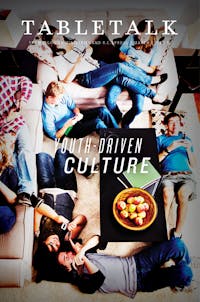
Request your free, three-month trial to Tabletalk magazine. You’ll receive the print issue monthly and gain immediate digital access to decades of archives. This trial is risk-free. No credit card required.
Try Tabletalk NowAlready receive Tabletalk magazine every month?
Verify your email address to gain unlimited access.
It’s a funny thing about slippery slopes—you can slide down them slowly. The principle behind the concept isn’t that you must move swiftly from here down to there if you have no moral brakes, but that you will move. A slippery slope with a gentle incline will have just as much slippage, though sliding to the bottom may take more time.
Consider the music our children listen to. My grandparents, I’m quite certain, were rather troubled by their children dancing to what we would now consider the positively clean music of Elvis. Between generations came the Beatles, who played in suits, and whose early mop-tops were more rascally than rebellious. By the time I turned on the radio, my parents objected to the suggestive lyrics of Aerosmith or the Red Hot Chili Peppers. Today there is no suggestive music anymore, because “suggestive” implies a measure of subtlety.
We got here not because we slept through the crossing of a Rubicon. Instead, we insisted that because our grandparents objected needlessly (compared to our parents), our parents must have objected needlessly (compared to us), and therefore we needed to refuse to object needlessly about our kids, knowing that their kids will be much worse. We have come to expect and accept rebellion—musically and morally—as a normal part of growing up. Some parents even begin to worry when their children don’t rebel.
All of this is evidence that even in the church we take our cues from the broader culture rather than from the Word of God. Take a moment and look in your concordance for teenager. Try adolescence. Try generation gap. See if you can find youth culture. Neither the words nor the concepts are there. These are not biblical categories. That they are common destructive elements in our homes ought to clue us in that we’re doing something wrong.
It is not enough, however, to clamp down. That is, it is not mere permissiveness that has gotten us into this mess. The problem runs deeper. It isn’t that we aren’t rightly handling the youth, but that we even concede the existence of the youth. The Bible recognizes happily the reality of children. It affirms the existence of adults. What it doesn’t do is embrace something in between.
The Bible nowhere affirms the existence of a youth culture because it everywhere encourages us to embrace a different culture—that of the kingdom of God. When Paul enjoins us to raise our children in the nurture and admonition of the Lord (Eph. 6:1), the root Greek word that is translated nurture in our English Bibles is paideia. It communicates the notion of a culture. It includes shared convictions, shared language, and shared habits of the heart.
When my oldest children were still young, my wife and I labored to be certain that their identity was in Christ, in our shared identity as a house that, like that of Joshua before us, would serve the Lord. I instilled this in my children partly through some rather basic familial liturgies. While Hollywood and Madison Avenue were seeking to get my daughter to see herself in terms of her demographic, I wanted her to see herself in light of her Savior. So I taught her, when I asked her name, this call and response: Me—”Darby, what are Sprouls?” Darby— “Sprouls are free.” Me—”And whom do Sprouls serve?” Darby—”Sprouls serve King Jesus.” Me—”Whom do Sprouls fear?” Darby—”Sprouls fear no man; Sprouls fear God.”
She is no longer a little girl, and one day she likely will no longer be a Sproul. But my daughter is indeed an arrow in my quiver. Because her identity is in Christ and not her peers, she spends less time walking around the mall and more time proclaiming Jesus outside our local abortion mill. Because her identity is in Christ, she sees her father not as an old fogey but as the man who loves her fully. She is about the business of seeking first the kingdom of God and His righteousness, because that is our calling.
Perhaps the most beautiful thing about her is that she not only serves but loves her father, her near-peer brother, her little sisters, and her two littlest brothers, who are seven and three. She interacts joyfully with young and old, for she loves all the saints, not just the ones who share her fashion sense or musical tastes.
Nathan Hatch once exposed the infiltration of peculiar American ideals into the church in his great book The Democratization of American Christianity. In our day, we are witnessing the demographicization of American Christianity. At best, we establish programs based on age, sex, and life situation. At worst, we have a church tailored to fans of country music and Mountain Dew at one site, and a church tailored to fans of jazz and Starbucks elsewhere. We are dividing what Christ has brought together; we are the Corinthians, except that we divide the body by taste rather than by income.
Jesus, however, makes of the many one. We are one family, one loaf, one body, one culture, one love. Would that the broader culture would be able to say of our culture, “Oh, how they love each other.”
